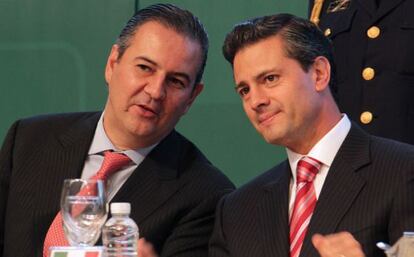“Mexico can no longer afford decafeinated reforms”
The business leader calls for the country can move “from scandals to sanctions”

Gerardo Gutiérrez Candiani (Oaxaca, 1966), president of the Coordinating Council of Businesses, the Mexican employers’ association, received the press on the eve of the government’s presentation this Sunday of a plan for fiscal reform and another demonstration of power from the left, this time from Andrés Manuel López Obrador, against the energy reform. Mexico’s president, Enrique Peña Nieto, has said that Mexico is putting its future on the line in the next 120 days, risking its political capital on a bet - the success of these reforms. The situation, however, does not inspire optimism: an economic slowdown on which the specter of a recession glides, changes without impact, teachers up in arms, and above all, a climate of corruption, impunity, and violence that can turn the life of any Mexican into a tragedy in a second, as illustrated in Amat Escalante’s awarding-winning film from Cannes, Heli.
He spoke of all of this, without shirking any question, this boss of bosses, an articulate young man who never utters words such as productivity, competition, transparency or opportunity. In a rather straightforward manner, Gutiérrez Candiani acknowledged the private sector's "very strong lobby in Congress." He said that 97 corporate lobbies came together to pressure legislators and that 59 of the 95 measures from the Pact of Mexico were initiatives from that group. Gutiérrez Candiani said that Mexico's future depends on the passage of these reforms. "The big challenge is to make sure that the reforms go as far as they should. We cannot afford decaffeinated reforms like the ones in the energy sector in 2008."
Now comes the fiscal part. With 60 percent of of the population working on the black market and a few monopolies operating above the threshold of what's right or wrong, Mexico is the OECD country that raises the lowest revenues from taxes. The reforms, which will be announced on Sunday, are meant to increase the government's financial resources, reduce evasion, simplify the tax code, eliminate a few privileges and subsidies, establish a new fiscal program like Pemex, and perhaps levy a sales tax on certain foods and medicines for the first time.
The business leaders' representative pointed out a few budgetary requirements. "Increase the pool of contributors in the first place, because it cannot always be the same Mexicans carrying the load all the time. Taxes on businesses need to be competitive so as not to encourage evasion. No special taxes that disrupts the market. The tax code should reduce black market activity and there should be a transparent management of government revenue at the federal, municipal, and state levels."
Despite warnings from experts that the fiscal reform may prove counterproductive given that the projection for GDP growth had been lowered from 3.6% to 1.8%, Gutiérrez Candiani is not afraid. He does not believe that the downturn will become a permanent condition. He said the economic halt is the result of internal and external causes. "The budgets were approved in mid-December and not in November as is usually the case," he explained. "And changes in the presidency tend to retard the rules of operation and creditors' meetings. There has also been a reduction in spending since the government decided to bring the deficit down to zero and there has been a steep drop in Mexican exports to the United States."
He warned that this trend, starting in 2012, could lead to a dangerous situation as it happened with exports from Canada and China. "With the energy reforms implemented in the United States starting with shale gas, it's possible that Mexican products will lose competitiveness but more so if we do not get the reforms through."
With regards to the energy sector, Gutiérrez Candiani praised the proposal from PAN (center-right), which is the most liberal. He qualified PRI's plan as "balanced" and he disposed of the PRD (left) measure with these words: "Their proposal would be very good 15 years ago. Right now it doesn't go far enough given the necessities of the sector and of the country."
But there is another deficit - an institutional deficit that can blow up in smoke even the best intentions. The reinforcement of long and exhaustive laws has been a matter pending resolution in Mexico. What professional, independent and respected institutions will oversee the contracts for shared use with the private sector that the Pemex reform proposes? Or its environmental impact? Or the payment of new taxes? The business leader was conscious of this challenge: "The government's report lacks a component - the fight against corruption, Gutiérrez Candiani began. The Pact of Mexico includes provisions for reinforcement from the government and other institutions and without that leg it would be difficult to implement the reforms and it would hard for Mexico to become the country we want it to be. Mexico has to move from scandals to sanctions."
Translation: Dyane Jean François
Tu suscripción se está usando en otro dispositivo
¿Quieres añadir otro usuario a tu suscripción?
Si continúas leyendo en este dispositivo, no se podrá leer en el otro.
FlechaTu suscripción se está usando en otro dispositivo y solo puedes acceder a EL PAÍS desde un dispositivo a la vez.
Si quieres compartir tu cuenta, cambia tu suscripción a la modalidad Premium, así podrás añadir otro usuario. Cada uno accederá con su propia cuenta de email, lo que os permitirá personalizar vuestra experiencia en EL PAÍS.
¿Tienes una suscripción de empresa? Accede aquí para contratar más cuentas.
En el caso de no saber quién está usando tu cuenta, te recomendamos cambiar tu contraseña aquí.
Si decides continuar compartiendo tu cuenta, este mensaje se mostrará en tu dispositivo y en el de la otra persona que está usando tu cuenta de forma indefinida, afectando a tu experiencia de lectura. Puedes consultar aquí los términos y condiciones de la suscripción digital.








































